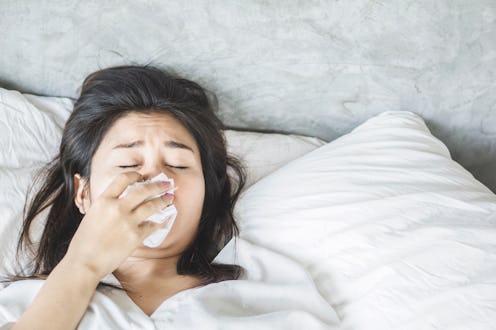Life
There's Actually A Scientific Reason Why You Feel So Tired During Hayfever Season

Hayfever really, really sucks. I can attest to that. Every May, at the end of the month, I start to get the absolute WORST symptoms: sneezing, an itchy throat, watery streaming eyes. You name it, I get it. And one thing I really notice every allergy season is the slump in energy I feel. Whether it's a side effect of hayfever itself, or simply as a result of constantly blowing my nose and sneezing, I always feel super fatigued by the end of the day. So does hayfever make you tired? Let's look into it.
Well, a simple answer is that yes, hayfever can make you tired. In fact, on the NHS' hayfever page, they note that "feeling tired" is one of the recognised symptoms, alongside the following:
- sneezing and coughing
- a runny or blocked nose
- itchy, red or watery eyes
- itchy throat, mouth, nose and ears
- loss of smell
- pain around your temples and forehead
- headache
- earache
So how exactly does hayfever make you feel that fatigue? Well, Healthline points out that having a constantly bunged-up nose and foggy head can affect the quality of your sleep, resulting in tiredness. However, they also explain that when you have an allergic reaction to something like pollen chemicals are released that can make you feel tired. They write:
"These chemicals help fight your allergies but also cause swelling of your nasal tissues that can make your symptoms worse," the publication explains. "A lack of sleep and constant nasal congestion can give you a hazy, tired feeling."
Heathline cleverly suggests using antihistamines to your advantage to improve things, however. Obviously, these pills are made in order to alleviate your symptoms on the whole, but it's best to use the 'non-drowsy' versions during the day, so as not to make any feelings of tiredness worse. You can then also try and take antihistamines that do cause drowsiness in the evening before bed, to help your symptoms prior to sleeping, and to make you nod off a little faster. Clever, huh?
The best way to help with symptoms is to really discover what triggers your hayfever, and what you are most allergic to. Many people are unaware that hayfever season typically runs from May through to September, but that it comes in three stages: tree pollen from March to May, grass pollen from May to July, and weed pollen from July to September. Most of us, including myself, are most allergic to grass pollen, making May, June, and July total hell usually. But at least if you know when and what you are avoiding, you can try and manage your symptoms as much as possible.
If you're suffering with hayfever, the NHS suggests the following options to remedy it:
- put Vaseline around your nostrils to trap pollen
- wear wraparound sunglasses to stop pollen getting into your eyes
- shower and change your clothes after you've been outside to wash pollen off
- stay indoors whenever possible
- keep windows and doors shut as much as possible
- vacuum regularly and dust with a damp cloth
- buy a pollen filter for the air vents in your car and a vacuum cleaner with a special HEPA filter
I've been dealing with hayfever for many years and by tip would suggest be to use over-the-counter medications or go to your doctor if you need something stronger to help. They can be a life saver.
This article was originally published on